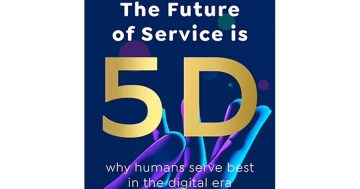Mitya Voloshchuk, Richard Steele and Elizabeth Mygatt* say tweaking a management system based on old rules will no longer be effective, executives must act now to start building their organisation in accordance with these new principles.
 In business today, we’re seeing a story unfold before our eyes, one that has happened before but not in our lifetime.
In business today, we’re seeing a story unfold before our eyes, one that has happened before but not in our lifetime.
When technologies converge, industries transform, and work is remade.
Since the 18th century, at least three industrial revolutions have occurred.
Organisations evolved—or closed. Predictability became king. Scale mattered. For the innovators, productivity soared.
The fundamental challenge now is that even the most successful companies today are designed to operate by the old rules of management thinking that emerged during the First Industrial Revolution, approximately 250 years ago.
They are mechanistic. They solve for uniformity, bureaucracy, and control.
Ask executives about organisation, and most reach reflexively for a hierarchical chart.
Our research over the past two years suggests that what we see now is not the Fourth Industrial Revolution, but the first true information revolution.
A new set of technologies is enabling the full automation of routine tasks, low transaction costs, and interconnection that enables self-organising complexity at unprecedented speed.
We see four macro trends unwinding the old rules of management:
More connection.
Global human interconnectivity is permanently shifting not only the speed of disruption but also the principles for disruptive innovation.
Information that moves freely instantly fuels change and bypasses—or even challenges—existing hierarchies and formalized change channels.
Emerging “chaos” drives unpredictability, both negative and positive, that organisations will have to embrace.
Unprecedented automation.
Technology at scale and low costs (from cameras everywhere to ubiquitous machine-to-machine interaction) are forever changing the way management creates value and improves efficiency.
We don’t need employees to act like machines anymore.
Lower transaction costs.
The free-market mechanism, the main reason for-profit corporations have flourished for the past 200 years, is becoming largely irrelevant.
More and more people are self-organising in a gig economy.
Demographic shifts.
Gen Z (and beyond) simply will not behave the same way as prior generations of employees; their demands are fundamentally different.
Companies that don’t respond will not survive.
Employees are voting with their feet.
These trends are not new—but they are now approaching tipping points, placing organisation at the top of the CEO agenda.
The COVID-19 pandemic is accelerating some of these trends: in recent months, we have seen the extraordinary forced shift of the workforce to remote environments and to areas of highest value creation (for example, warehouse and delivery services hiring hundreds of thousands of employees), increased agility of internal teams, and the next level of diffusion between “corporate” and “gig” economies.
Although management theory has evolved, its foundation, which includes a hierarchical organisational structure with specialized departments and roles, has remained largely intact:
- Organisations can be optimised as machines for efficiency and productivity
- Stability and predictability at minimal risk are most important
- Surprises are bad
- Behaviour should be controlled
- Labour is a factor of production
Tweaking a management system based on these old rules will no longer be effective.
Those rules were a response to a world in which people’s lives changed incrementally from one generation to the next and information came from physical—and later analog—sources.
Further, the cost of acquiring proprietary information contributed to relatively high transaction costs because of the time, energy, and money required to obtain it.
Collectively, the four macro trends require companies to adopt a set of new principles.
Many of these new principles—such as anti-fragility, experimentation, adaptability, behavioural and systemic views of organisation, human-centricity, inspiration in place of control, and positive surprises—are becoming increasingly critical to survival.
As the trends change the very nature of complexity, executives must act now to start building their organisation in accordance with these new principles.
*Elizabeth Mygatt and Mitya Voloshchuk are writers at McKinsey.
*Richard Steele designs and delivers purpose-driven transformation programs at McKinsey.
This article first appeared at mckinsey.com











